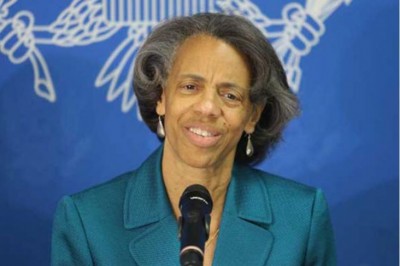No Plans to “Invade” Bangladesh to Fight Terrorism : US Ambassador

The U.S. has no desire to invade Bangladesh, or take over the country in the name of assisting Bangladesh in fighting terrorism, said U.S. Ambassador Marcia Bernicat on Wednesday. Bangladesh has been a key recruiting ground for Afghanistan fighters during the 1980s and Al-Qaeda linked networks continue to play a role in regional tensions with geopolitical implications.
Ambassador Marcia Bernicat was speaking at a meeting at the American Chamber of Commerce at its office in Dhaka. Her statement was published by the U.S. embassy. The statement quotes Ambassador Bernicat as saying:
“I have been sad to see reports lately of some people who are saying that U.S. offers to provide counter-terrorism assistance are either our effort to invade Bangladesh, or take over Bangladesh, or control Bangladesh in some way, or even to drag you onto a battlefield. … We have no such desire to occupy this country in any way. I just want to assure you that the types of assistance we provide to you are those of a partner; those of a partner who unfortunately has been fighting terrorism for a long time. … And again, more importantly, we must work on this challenge jointly. No country today can fight terrorism alone because the terrorists don’t operate within borders. We are looking to Bangladesh as a partner in this effort. … Our country’s assistance to Bangladesh aims to help the country ride out the crisis. Bangladesh should create an example that defies the ideology of these groups: Bangladesh is a Muslim majority country, which has adopted a market economy, a great democracy, and you have women in key leadership positions and a woman as head of the government. You are the very example they wish to crush.”
The Ambassador was thanking the Hasina-government for its efforts to fight terrorism and noted that Bangladesh also needs to conduct a rigorous, open and thorough investigation of these attacks that coordinates closely with the international partners. Bernicat added:
“And there needs to be an openness to accept the findings of the investigations wherever – and to whomever – they lead. Only this level of commitment will counter the threat in Bangladesh.”
Bangladesh was one of the main regional contributors to “mujahedeen” during the U.S., Saudi, Pakistani and Bangladeshi intelligence linked fight against Soviet troops in Afghanistan via the Al-Qaeda network. One of the products of this period, Harukat-ul-Jihad-al-Islam (HuJI) is active until this day. In 2012 a retired Bangladeshi military intelligence officer informed nsnbc that HuJI still functions as an instrument of Bangladeshi and U.S. intelligence.
The informant, whose name and credentials are known to nsnbc stressed that HuJI, among others, is allowed to infiltrate refugee camps for internally displaced Bangladeshi Rohigya as well as Rohingya refugee camps in neighboring Myanmar’s Rakhine State to destabilize Myanmar and Rakhine State in general. Bangladesh and Myanmar have fought several wars, initiated by Bangladesh, over Rakhine State. The region is the most rich region in terms of natural gas and other resources in the greater Mekong region.
Rivalling energy-security interests over Myanmar’s gas resources, between Bangladesh, Myanmar, China, India, as well as U.S. and British cartels were fueling the use of HuJI as a geopolitical instrument. The transition to a generally more U.S.-leaning government in Myanmar may, as Ambassador Bernicat’s statement may suggest, indicate a change in U.S. and possibly Bangladeshi policy with regard to the use of HuJI and other Islamist terrorist organizations and insurgencies in Bangladesh and Myanmar.

